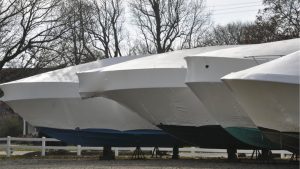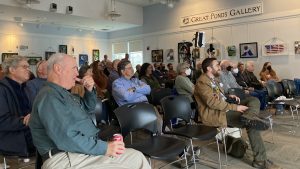Search results for: VIPREG2024 free promo code for 1xbet Saudi Arabia
Falmouth Participates in Cape-wide Boat Shrink Wrap Recycling Program
This spring, the town of Falmouth will be accepting boat shrink wrap plastic at the town’s waste management facility as part of a recycling program run by WHOI Sea Grant and Barnstable County’ Cape Cod Cooperative Extension in partnership with municipalities across the Cape and Cape Cod AmeriCorps. Falmouth joins the towns of Bourne, Dennis,…
Read MoreWHOI-R-05-004 Bernhard, A. E. Loss of Divers
WHOI-R-05-004 Bernhard, A. E. Loss of Divers
Read MoreRiver Herring Network Gathers
Woods Hole Sea Grant’s Abigail Archer is the River Herring Network coordinator and helped organize this year’s annual meeting, which included participants from 16 towns, 12 watershed organizations and nonprofits, three federal agencies, three state agencies, and two academic institutions. After two years of meeting virtually, river herring wardens and others from along the Massachusetts…
Read MoreAn Ethogram of Body Patterning Behavior in the Biomedically and Commercially Valuable Squid Loligo pealei off Cape Cod, Massachusetts
An Ethogram of Body Patterning Behavior in the Biomedically and Commercially Valuable Squid Loligo pealei off Cape Cod, Massachusetts Hanlon, R.T., M.R. Maxwell, N. Shashar, E.R. Loew, and K.-L. Boyle Biol. Bull., Vol. 197, pp. 49-62, 1999 WHOI-R-99-005
Read MoreThe Introduction of Limited Entry: The New Zealand Rock Lobster Fishery
The Introduction of Limited Entry: The New Zealand Rock Lobster Fishery Annala, J.H. Marine Policy, pp. 103-108, 1983 WHOI-R-83-022 The rock lobster fishery has traditionally been New Zealand’s single most important domestic fishery in terms of the number of vessels and fishermen employed and the value of landings and exports. This paper describes the implementation…
Read MorePurchasing Coastal Property? New Brochure Addresses Common Questions
Are you considering buying property near the water? A new brochure from Woods Hole Sea Grant, Questions and Answers on Purchasing Coastal Real Estate in Massachusetts is now available. This brochure focuses on questions you should ask (and where to find the answers) as a potential purchaser of coastal real estate. This resource provides information about…
Read MoreLesson Plans and Classroom Visits
Lesson Plans and Classroom Visits Coasts, Oceans, and Stewardship Program (COAST) This program is a collaboration between the NOAA Northeast Fisheries Science Center and WHOI Sea Grant. WHOI Sea Grant (WHOI SG) and the Northeast Fisheries Science Center (NEFSC) in Woods Hole, MA developed a program to create educational materials relating to key marine and…
Read More

